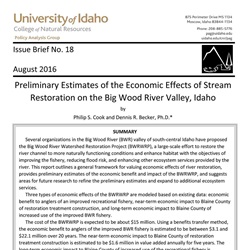Newsletters
The Policy Analysis Group at the University of Idaho will be sharing periodic newsletters that provide information about our research on natural resource policies important to the citizens of Idaho.
To sign up for the Policy Analysis Group newsletter, please visit the U of I's email preference center under the College of Natural Resources.
Planting Seeds
As spring arrives, it’s time to look forward to upcoming projects from the Policy Analysis Group. In the past couple years, we’ve seen our capacity grow and investments take fruit. We’ve added expert staff, increased opportunities for students and expanded the range of natural resource policy issues we analyze. We have done this to improve our commitment to the citizens of Idaho to provide high-quality analysis and timely analytics to inform decisions as well as foster communication and transparency in natural resource policy management.
In this newsletter, we highlight our recent reports on Idaho’s forest products industry. Upcoming reports will include those about the impacts of forest collaboratives on hazardous fuels reduction in Idaho’s national forests, the impacts of public lands on county finances and the contribution of state endowment lands to Idaho’s economy.
But it's not enough to simply generate reports. The value of the Policy Analysis Group is in our impact on policy decisions through sharing the knowledge we generate and listening to ideas. We welcome opportunities to work with local officials, communities, agency leaders and associations. Share your ideas with us, and help us share our information. Subscribe to receive future updates from the Policy Analysis Group.
We need your help to broaden the impact of the Policy Analysis Group. Please share this newsletter with others who may find our services and products useful.
Recent Publications
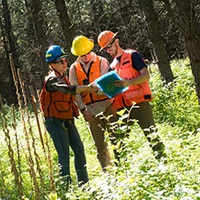 Idaho’s Forest Products Industry 2017
Idaho’s Forest Products Industry 2017
In this annual report released in January 2018, we track timber harvest volumes and forest product industry sales and production over time for the state of Idaho.
 Economic Contributions of Idaho’s Forest Products Industry
Economic Contributions of Idaho’s Forest Products Industry
As a companion to the annual industry report, we estimate how the forest products industry contributes to Idaho’s economic wellbeing through jobs, labor income and value-added production.
 Idaho Family Forest Owners
Idaho Family Forest Owners
Why do people own forests in Idaho? What are their future management plans? These are a few of the questions the Policy Analysis Group analyzed by surveying a portion of the more than 36,000 family forest owners in the state.
 State Funding for Wildfire Suppression
State Funding for Wildfire Suppression
State obligations for wildfire suppression in ten western states averaged $1.25 billion annually from 2005 to 2015, trending upward at a rate of five percent. The Policy Analysis Group investigated state approaches for funding wildfire suppression to increase predictability and anticipate fiscal impacts.
Upcoming Reports
Economic Contribution of Idaho’s State Endowment Lands
The revenue generated from Idaho’s endowment lands, mostly from the sale of timber and earnings on investments, provides support to public schools and 13 other public institutions. This study will develop improved estimates of economic activity — output, jobs, and labor income — generated as a result of managing endowment lands.
Economic Contributions of Idaho’s Natural Resources
Idaho has an abundance of natural resources that contribute to the state’s economic wellbeing: forest and timber; mineral and energy resources; and rangelands as well as wildlands, fish and wildlife. This study will provide improved estimates of economic contributions for all natural resource-based sectors of the state’s economy.
Impact of Forest Collaboratives
This study analyzes the impact of forest collaboratives on the pace and scale of hazardous fuels reduction projects, timber harvesting and related forest management activities on Inland Northwest national forests. The results will inform efforts to assist forest collaboratives and focus agency resources where greater attention is needed.
Forest Market Impacts of Federal Timber Harvesting
Increasing the volume of forest management activities, including harvesting timber on national forest lands, can enhance forest health and reduce wildfire risks. But increasing harvest volume will also impact regional timber markets. This project will provide a robust analysis of those market impacts to improve information about where and how those activities could affect future management actions.
Tax Implications of Public Lands
Local governments typically rely upon property taxes to fund schools and roads. However, public lands in Idaho are not taxed, which causes financial strain for counties with a lot of land base in state or federal management. Over the years, policies have been devised to mitigate these challenges with varying success. This study will assess the current financial situation of Idaho counties and evaluate potential future funding strategies.
Outcome-Based Rangeland Management
The U.S. Bureau of Land Management, U.S. Forest Service and Idaho Department of Lands administer grazing leases and permits on over 12 million acres of Idaho rangelands. Consequently, public land management agencies have substantial influence on economic opportunities and ecological outcomes on much of the state’s rangelands. This project will evaluate administrative rules and other policy options that enable outcome-based management actions that improve rangeland health and are more responsive to agency and rancher needs and challenges.
Our Team
Our researchers have significant experience in natural resources policy. We are proud to report we have more than doubled our research capacity in the last year to better serve our stakeholders in the state of Idaho.
Introducing our Newest Member:
Chelsea McIver, doctoral research assistant, comes to us from the Bureau of Business and Economic Research at the University of Montana where she was a research specialist in the Forest Industry Research Program. She is a native Idahoan and happy to be coming back to her home state. Chelsea currently lives in Missoula, MT with her seven-year-old daughter and plans to join us in Moscow in August.
- Dennis Becker, Director — drbecker@uidaho.edu
- Philip Cook, Principal Researcher
- Greg Alward, Senior Scientist — galward@uidaho.edu
- Greg Latta, Research Assistant Professor — glatta@uidaho.edu
- Raju Pokharel, Postdoctoral Fellow — rpokharel@uidaho.edu
- Katherine Wollstein, Doctoral Research Assistant — woll2114@vandals.uidaho.edu
- Michelle Benedum, Masters Research Assistant — bene7481@vandals.uidaho.edu
- Chad Washington, Masters Research Assistant — cwashington@uidaho.edu
Learn more about our staff and their professional experience by viewing their biographies.
Fall is in the Air!
With changing seasons we are also welcoming new staff to the Policy Analysis Group. We welcome Katherine Wollstein and Michelle Benedum as research graduate assistants in the College of Natural Resources.
This season is also a time for celebration – the College of Natural Resources is celebrating our centennial anniversary this year, and the Policy Analysis Group turns 28! For almost 3 decades, we have been bringing you rigorous analysis of natural resource issues important to the citizens of Idaho. We strive to inform state and federal management, and provide neutral go-to analysis of forestry, fisheries, wildlife, range, and related natural resource policies.
In this second newsletter we provide information about state wildfire suppression funding in the western U.S., grazing rates on Idaho endowment lands, and Idaho family forest owner demographics and ownership motivations. We’re also working on several new projects including updated analysis of the contribution of Idaho endowment lands, and of the forest products industry to the state’s economy.
The Policy Analysis Group was established by the Idaho Legislature in 1989 to provide timely, scientific, and objective data analysis of the impacts of natural resource proposals. We work on a variety of projects ranging from general policy education and research synthesis, to comprehensive analyses of state and federal natural resource policies.
We need your help to broaden the impact of the Policy Analysis Group. Please share this newsletter with others who may find our services and products useful.
Recent Publications
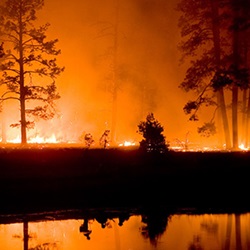 Report No. 37:
Report No. 37:
State Funding for Wildfire Suppression in the western U.S.
State obligations for wildfire suppression in ten western states averaged $1.25 billion annually from 2005 to 2015, trending upward at a rate of 5.2%. In 2015, Idaho taxpayers were responsible for more than $60 million in suppression costs. The Policy Analysis Group investigated cost trends and funding approaches used in western states to increase financial predictability, and anticipate the possibility of escalating future costs.
 Issue Brief No. 20:
Issue Brief No. 20:
Review of Idaho’s Forest Legacy Program
What are conservation easements, and how are they used to keep working forests working? These questions are addressed in a review of the federal Forest Legacy Program and its implementation in Idaho. The Policy Analysis Group examined how the program operates, its local financial impacts, and emerging issues associated with the state’s involvement.
 Issue Brief No. 21:
Issue Brief No. 21:
Maintenance of Non-motorized Trails on National Forests in Idaho
National forests in Idaho contain about 10,000 miles of non-motorized trails. Although Idaho’s national forests saw increasing amounts of trail maintenance over the last decade due in part to increased funding from the American Recovery and Reinvestment Act of 2009 (i.e., the stimulus bill), the proportion of Idaho’s national forest trails that met National Quality Standards was steady over the last decade, averaging 30%. This study investigated the condition and sources of funding for non-motorized trail maintenance on national forests in Idaho, including sources of funding used by neighboring states.
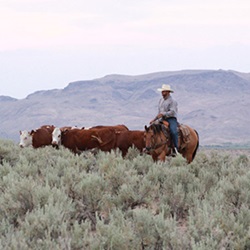 Idaho Endowment Lands Grazing Rate Review
Idaho Endowment Lands Grazing Rate Review
The formula to calculate grazing rates on state endowment lands has remained largely the same for the past 25 years. For the past year the Policy Analysis Group has been providing technical assistance and review of proposed grazing rate alternatives. The Idaho State Board of Land Commissioners will use this information to make a decision later this year about new grazing rate calculations.
What are state endowment lands?
Endowment lands, or “trust lands,” are lands managed by a state for a designated beneficiary, for example public schools, public universities or prisons. Endowment lands do not include state parks, wildlife management areas, “sovereign lands” or other public lands held under the “public trust doctrine.”
Upcoming Projects
Idaho Family Forest Management Decisions (coming winter 2017)
Why do people own forests in Idaho? Will they pass them on to family members or sell for development? What actions are they taking to reduce wildfire threats? These are a few of the questions the Policy Analysis Group is analyzing from its winter 2016 survey of nearly 3,000 of the 36,000 family forest owners in Idaho. We’re preparing two reports. One, in conjunction with the McClure Center for Public Policy Research at the University of Idaho, will be a brief synopsis of findings about family forest owner demographics, motivations, and forest management practices. The other will be used by the Idaho Department of Lands and the University of Idaho Extension to improve technical assistance programming.
Economic Contribution of Idaho’s Endowment Trust Lands (coming winter 2017)
The revenue generated from Idaho endowment lands—mostly from the sale of timber and earnings on investments—provides long-term support to higher education, state hospitals and veterans homes, the Capitol building, the Idaho School for the Deaf and Blind, Idaho's juvenile corrections system, and Idaho's prison system. This study will generate improved estimates of economic activity, jobs, and income generated as a result of Idaho endowment trust lands.
Idaho’s Forest Products Industry 2017 (coming January 2018)
In this annual report about the state of the Idaho forest products industry, information is presented on the volume of timber harvested and processed within the state, total sales and related indicators tracked over time. Updated industry rosters will be available along with estimates of jobs and related economic impacts.
Outcome-Based Grazing Management (coming spring 2018)
The BLM administers 1,879 grazing permits covering 12 million acres in Idaho. Consequently, land management agencies have substantial influence on the economic and ecological outcomes of much of the state. The purpose of this project is to evaluate state and federal policy options that enable outcome-based grazing actions that improve rangeland health and are more responsive to rancher needs and challenges.
Our Team
Our researchers have significant experience in natural resources policy. We are proud to report we have more than doubled our research capacity in the last year to better serve our stakeholders in the state of Idaho.
- Dennis Becker, Director — drbecker@uidaho.edu
- Philip Cook, Principal Researcher
- Greg Alward, Senior Scientist — galward@uidaho.edu
- Greg Latta, Research Assistant Professor — glatta@uidaho.edu
- Raju Pokharel, Postdoctoral Fellow — rpokharel@uidaho.edu
- Katherine Wollstein, Doctoral Research Assistant — woll2114@vandals.uidaho.edu
- Michelle Benedum, Masters Research Assistant — bene7481@vandals.uidaho.edu
- Chad Washington, Masters Research Assistant — cwashington@uidaho.edu
Learn more about our staff and their professional experience by viewing their biographies.
Starting this year, the Policy Analysis Group at the University of Idaho will begin sharing periodic newsletters that provide information about our research on natural resource policies important to the citizens of Idaho. In this first newsletter, we highlight our recent publications and upcoming projects, and introduce you to our team members. We look forward to your feedback.
We need your help to broaden the impact of the Policy Analysis Group. Please share this newsletter with others who may find our services and products useful.
The Policy Analysis Group was established by the Idaho Legislature in 1989 to provide timely, scientific and objective data analysis of the impacts of natural resource proposals. We work on a variety of projects ranging from general policy education and research synthesis, to comprehensive analyses of state and federal natural resource policies.
Recent Publications
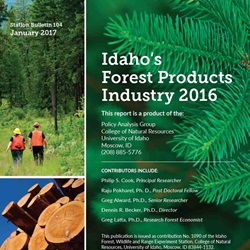 Station Bulletin 104: Idaho’s Forest Products Industry 2016
Station Bulletin 104: Idaho’s Forest Products Industry 2016
January 2017 — Philip Cook, Raju Pokharel, Greg Alward, Dennis Becker and Greg Latta
Our annual forest products industry report provides up-to-date information about lumber prices and sales, production, direct employment and forest harvest trends.
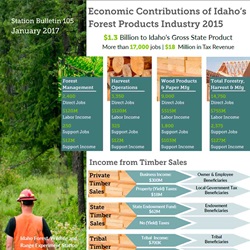 Station Bulletin 105: Economic Contributions of Idaho's Forest Products Industry 2015
Station Bulletin 105: Economic Contributions of Idaho's Forest Products Industry 2015
January 2017 — Greg Alward, Phil Cook and Dennis Becker
Using the latest information, this report analyzes the economic contribution of the forest products industry in terms of direct and indirect jobs, sales and income at the state and county levels.
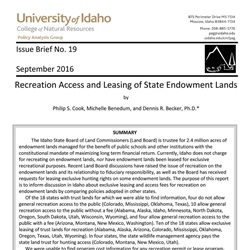 Issue Brief No. 19: Recreation Access and Leasing of State Endowment Lands
Issue Brief No. 19: Recreation Access and Leasing of State Endowment Lands
September 2016 — Philip Cook, Michelle Benedum and Dennis Becker
This report compares the practices of 18 states regarding the exclusive leasing of state endowment lands for recreation, and relevance for the state of Idaho.
What are state endowment lands?
Endowment lands, or “trust lands,” are lands managed by a state for a designated beneficiary, for example public schools, public universities or prisons. Endowment lands do not include state parks, wildlife management areas, “sovereign lands” or other public lands held under the “public trust doctrine.”
Issue Brief No. 18: Preliminary Estimates of Economic Effects of Stream Restoration on the Big Wood River Valley, ID
August 2016 — Philip S. Cook and Dennis R. Becker
This report analyzes the potential long-term economic benefits to Blaine County from restoring portions of the Big Wood River for fisheries and flood control.
Upcoming Projects
Review of Idaho’s Forest Legacy Program (coming Spring 2017)
What are conservation easements, and how are they used to keep working forests working? These questions are addressed in an upcoming review of the federal Forest Legacy Program and its implementation in Idaho. The Policy Analysis Group is examining how the program operates, its local financial impacts and emerging issues associated with the state’s involvement.
State Funding for Wildfire Suppression (coming Spring 2017)
The Idaho Department of Lands is responsible for wildfire suppression on most state and private forests in Idaho. The costs are ultimately passed on to state taxpayers, who through deficit spending — putting out wildfires one year and asking the legislature for the money the following fiscal year — were responsible for more than $60 million in suppression costs in 2015. The Policy Analysis Group is investigating funding approaches used in western states to increase financial predictability, and anticipate the possibility of escalating costs in future years.
Family Forest Landowner Survey (coming Summer 2017)
Why do people own forests in Idaho? Will they pass them on to family members or sell for development? What actions are they taking to reduce wildfire threats or to improve forest health? These are a few of the questions the Policy Analysis Group asked nearly 3,000 landowners in a survey last November. The findings will be used by Idaho Department of Lands and the University of Idaho Extension Forestry to improve technical assistance programming targeted at landowner needs.
Our Team
Our researchers have significant experience in natural resources policy. We are proud to report we have more than doubled our research capacity in the last year to better serve our stakeholders in the state of Idaho.
- Dennis Becker, Director — drbecker@uidaho.edu
- Philip Cook, Principal Researcher
- Greg Alward, Senior Scientist — galward@uidaho.edu
- Greg Latta, Research Assistant Professor — glatta@uidaho.edu
- Raju Pokharel, Postdoctoral Fellow — rpokharel@uidaho.edu
- Spencer Plumb, Postdoctoral Fellow — splumb@uidaho.edu
Learn more about our staff and their professional experience by viewing their biographies.







